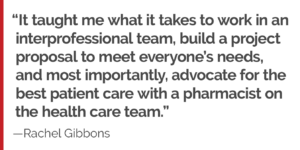PharmD students and volunteers hone key skills while working to impact public health in underserved communities
By Katie Ginder-Vogel
When Elyse Keating and Rachel Gibbons took the helm of Operation Airways in 2017, they immediately identified an opportunity for growth, improved patient outreach, and improved community health.
As students in the PharmD program at the University of Wisconsin–Madison School of Pharmacy, Keating and Gibbons got involved in the program through the Wisconsin Society of Pharmacy Students (WSPS), which is the School’s student American Pharmacists Association (APhA) chapter.
Operation Airways — which is one of several programs, including Operation Heart and Operation Immunization, run by WSPS to help community members take control of their health — managed a recurring booth at the free student-run MEDiC clinic at the Salvation Army family and women’s shelter to provide resources for patients who wanted to quit smoking.
“The booth was underutilized by patients, and Rachel and I thought about how we could better achieve our goal to promote smoking cessation awareness and provide resources to those who need better access to care,” says Keating. “We thought, what if we integrated a smoking cessation service into the MEDiC clinic?”
When Keating (DPH-3) and Gibbons (DPH-4) decided to take on this challenge, they asked their Operation Airways advisor through WSPS, Maria Wopat (PharmD ’10), for her guidance in structuring Operation Airways to become a part of the Salvation Army MEDiC clinic. They presented their initiative to the MEDiC clinic coordinators and advisory council, and were approved to pilot the program. In August 2018, after a successful pilot period and a few growing pains, the Operation Airways Pharmacy-Run Tobacco Cessation Program was approved as a permanent part of the Salvation Army MEDiC Clinic.
“We have amazing pharmacist support and have worked closely with the medical students who also staff the clinic to implement the service, so it has been very rewarding to see it all come together,” says Keating.
How it works
The Salvation Army MEDiC Clinic is open on Tuesday evenings, and on the fourth Tuesday of each month, a pharmacist preceptor, an Operation Airways co-chair, and two student pharmacists (one in clinic with the pharmacist preceptor and one in the hallway at the informational table), stand ready to help patients take their first steps toward quitting smoking. When a patient interested in quitting smoking enters the MEDiC clinic or approaches the table in the hallway, they are directed to the Operation Airways area of the clinic, where they have an in-depth consultation with the pharmacist and student pharmacist trained in motivational interviewing, behavioral counseling and nicotine replacement products.
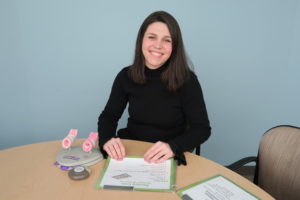
“It’s a great time for patients to tell their story, and it’s vital for students to get this in-practice experience interacting with patients and discussing sensitive topics like behavioral changes,” says Keating. “After the consultation and collaboration with the patient, if the pharmacist preceptor and student pharmacist agree that nicotine replacement therapy is worth pursuing, Operation Airways will create and document a patient-specific care plan and will present this to the MEDiC primary care provider.”
After discussion of the care plan with the provider and collaboration to prescribe the correct therapy, the Airways team consults with the patient about nicotine replacement therapy, and the patient leaves with a prescription that can be filled at any retail pharmacy.
“Students not only gain motivational interviewing experience, but they also interact with staffing providers and counsel patients on their specific smoking cessation therapy to ensure proper use,” says Keating. “From beginning to end, we’re centered on patient goals and how we can work together to achieve them.”
Outside the MEDiC clinic, a second student pharmacist is located at a table covered in smoking cessation resources near the Salvation Army’s front door. “They are there to generate interest and see if patients want to talk informally about quitting smoking or join the full service in the clinic,” says Keating. “It’s a different stage of motivational interviewing.”
The information booth doesn’t just reach patients — it reaches their children, too.
“Kids will stop to color and look at our info and say, ‘Mom, come over here; you’re not supposed to be smoking,’” says Keating. “It raises awareness about smoking’s impact on health, and even if someone’s not ready to quit today, maybe we have planted a seed. Even that interaction is powerful.”
Plans for expansion
Keating is working with the new Operation Airways co-chair, Ashley Alter (DPH-2), to expand Operation Airways’ smoking cessation services through the addition of follow-up phone calls every two weeks to patients who have joined the program and been prescribed nicotine replacement therapy. The purpose of the follow-up calls is to evaluate medication safety and efficacy and support patients’ efforts.
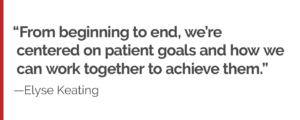
As incoming Operation Airways chair, Alter has some ideas of her own to augment the impact of the new service.
“In the coming year, I really want to complete more follow-up visits with the patients we see in our smoking cessation program, so we can assist them while they are going through the quitting process,” says Alter.
The Operation Airways team, which consists of about fifteen volunteer pharmacy students, also travels to local middle and high schools once or twice a semester to present information about smoking cessation. In the face of rising e-cigarette use among teenagers, those presentations are an increasingly valuable way to let students know that the devices aren’t a safe alternative to smoking.
“Right now, there is a big climb in the use of e-cigarettes, and I would like to create a presentation or add material to our current presentation to inform students about the risks they carry,” Alter says. “Hopefully we can reach the next generation to keep them from falling into the trap of smoking.”
Preparing student volunteers for careers
Keating says different student volunteers take away different things from volunteering with Operation Airways.
“Students who haven’t had much clinical training yet can learn about medications and how to talk to a patient in a clinical setting,” she says. “Other students are excited to see what pharmacists can do in the community.”
Gibbons says her role in leading Operation Airways has been important to her professional development as a pharmacist.
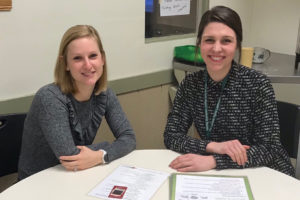
“It taught me what it takes to work in an interprofessional team, build a project proposal to meet everyone’s needs, and most importantly, advocate for the best patient care with a pharmacist on the health care team,” Gibbons says.
Molly Lehmann, a second-year Ambulatory Care Pharmacy Resident at William S. Middleton Memorial Veterans Affairs Hospital, where she engages in patient care and does some precepting, was also instrumental in creating the pharmacy-led smoking cessation program with Keating and Gibbons. She volunteers as a preceptor at the MEDiC clinic, which she says has allowed her to develop her mentoring and project management skills. Lehmann has gone from being the sole preceptor to one of five.
“Within clinic, student pharmacists are challenged to lead patient interviews, provide in-depth education, engage in motivational interviewing, and offer medication recommendations to providers,” says Lehmann. “This experience helps students to develop confidence and competence in tobacco cessation management outside of the classroom, while placing an emphasis on preventative health and service to our community members.”
When Keating began pharmacy school, she envisioned herself working in a small community pharmacy after graduation. She says her Operation Airways experiences have led her to focus on primary and ambulatory care, in a capacity that will allow her to include underserved populations as patients.
“I have fallen in love with the humanity of a simple patient interaction,” she says. “These patients are an underserved population, and they don’t always get the respect or treatment they deserve from the health system. If I can make them feel secure, cared for, and confident in themselves and their ability to achieve their goals, that’s what matters to me. Those are the patient relationships I want to develop.”
High-quality community outreach
Operation Airways is just one of several community-focused initiatives run by WSPS, and the student pharmacists behind each of them are continually working to innovate new services and provide high-quality care to community members. For their contributions to community health and to the development of student pharmacists’ real-world skills, two of the programs, Operation Diabetes and GenerationRx, recently won awards at the 2018 APhA Region 4 Midyear Regional Meeting.
Operation Diabetes holds screening events at health fairs and public events in the Madison area, offers presentations about healthy lifestyles for local students in elementary school through high school, and conducts free testing for at-risk patients with limited access to medical services.
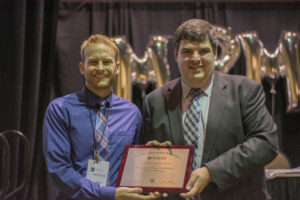
“Operation Diabetes is helping make direct patient interventions throughout South Central Wisconsin,” says Operation Diabetes co-chair Greg Kuhlman (DPH-3), whose personal experience with diabetes within his family spurred his interest in the project. “During my first year, I was hooked when I saw how this operation was directly involved in helping patients deal with or prevent diabetes.”
Kuhlman’s co-chair Jess Linderud (DPH-3) got involved with Operation Diabetes as a first-year student pharmacist, when she volunteered for an after-school presentation to teach middle school students about the disease, healthy lifestyle choices and how to read nutritional labels for healthy eating.
“Now, as co-chair, I am able to work with Greg and other members of our committee to improve patients’ lives by organizing our participation in community events,” says Linderud. “During these events, student pharmacists work directly with patients and gain real-world experience communicating difficult topics to people who may have low health literacy, language barriers or who are of a different culture and belief system.” All of those demographic differences impact patients’ understanding of the disease and treatment options.
WSPS’ GenerationRx goes into the Madison community to educate high school and college students; young families; and seniors about the importance of preventing prescription medication misuse and abuse.
“It is a great way for the student members of our operation to practice leadership and presentation skills, while also giving back to their community, says GenerationRx co-chair Britney Youngchild (DPH-2).
“It is crucial to start educating and advocating on the importance of medication safety as early as we can, especially in a time where our health care system is facing the opioid epidemic,” she says. “It is our mission to reach as many people as we can and hope we can make a difference in the lives we reach.”
Learn more about student pharmacists’ involvement at the MEDiC clinic.
